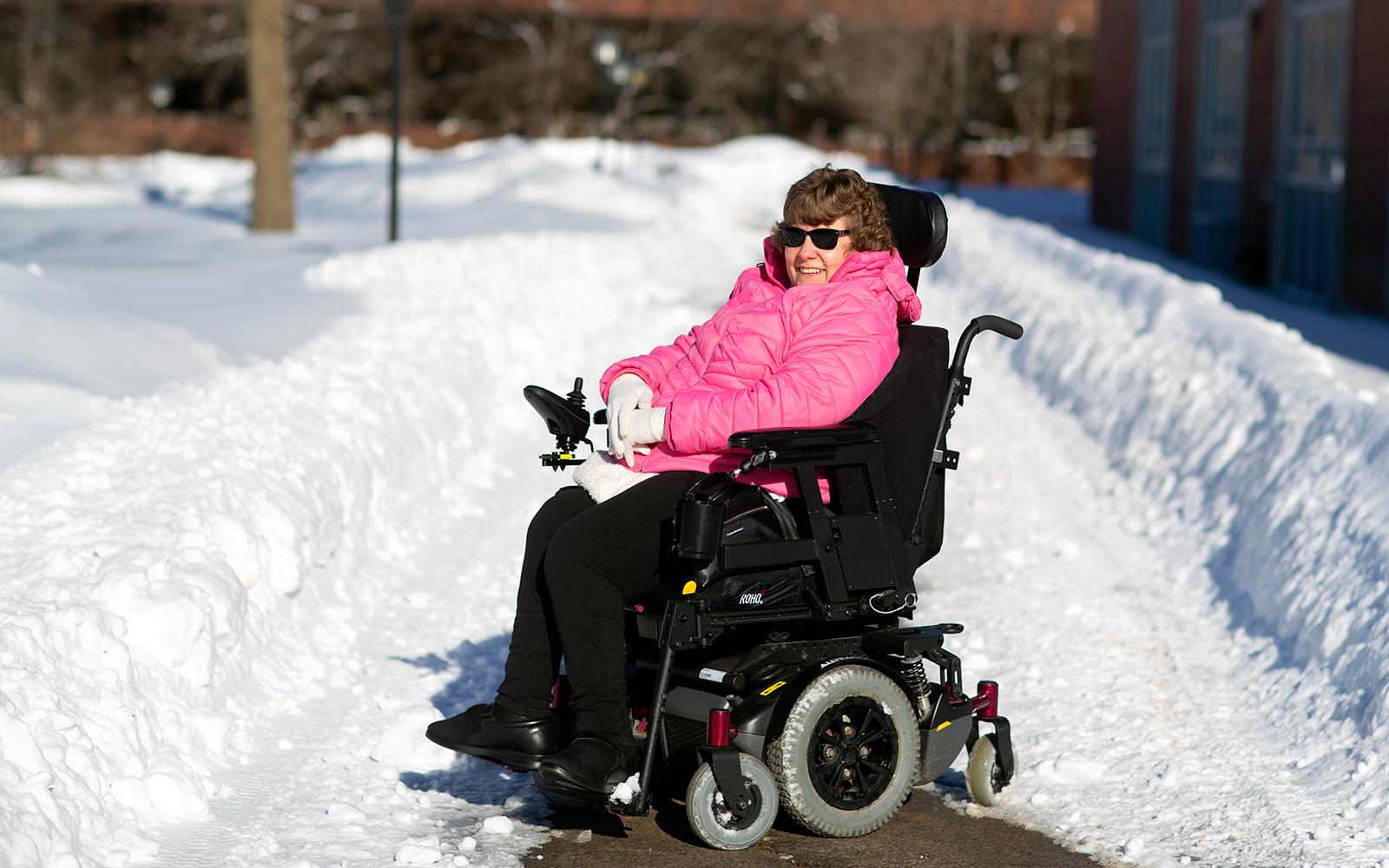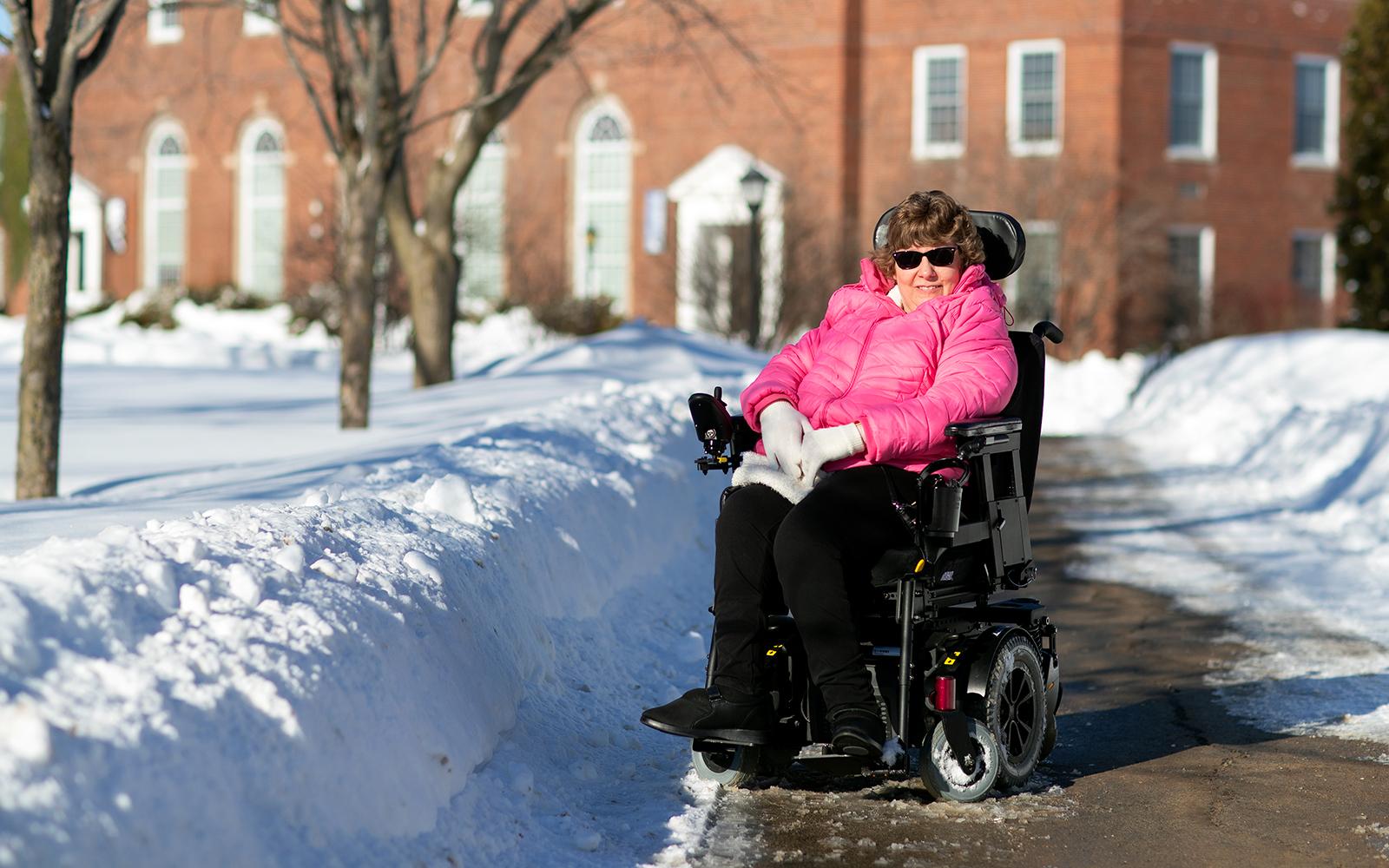There is a belief within Jungian psychology and mystical thought systems that our most significant gifts to the world can originate from our greatest setbacks—if we battle for that transformation. Pamela Charleson ’06 & ’08, sets an example of how to live this good fight. She also sounds a clear call that educators must do more to respond to the diversity and varied circumstances of those they are intended to serve.
Charleson, who has cerebral palsy, was a caregiver for two aging parents while she completed her advanced certificate in college teaching from SUNY Potsdam last December. Designed to hone instructional skills that involve and inspire students, the certificate was a goal she wouldn’t have been able to complete without the flexibility built into the all-online coursework. The skills will be key in helping the lifelong North Country resident advance her dream of spreading awareness of the needs of students with disabilities through her own lived narrative.
That story began in Charleson’s very early school days. Reflecting back on the challenges of public classrooms of the 1980s, she doesn’t blame her teachers for the difficulties she faced. Their intentions were not harmful—they simply lacked necessary understanding, and the framework for addressing special needs in the nation’s schools had not yet been built.
“I was the only student in a wheelchair, and teachers didn’t know what to do with a disability in the room, how to help us get outside, those kinds of things,” Charleson recalled. “There weren’t the laws to protect us. My parents had to do a lot of mediation on my behalf.”

From a young age, Charleson set her sights on an education degree from SUNY Potsdam. Some history was already contained in the buildings; her father was a bricklayer who had helped construct the College. In 1995, Charleson graduated from high school with honors. She went on to earn a Bachelor of Arts degree in English Literature and early childhood education, magna cum laude, from SUNY Potsdam in 2006, followed by a Master of Science in Special Education, with distinction, in 2008.
During these years, Charleson accrued a list of 14 awards and honors, including a New York State Assembly Certificate of Merit, the James Walter & Ruth Johnson Scott Undergraduate Student Scholarship, the Lorraine Mader Bryner Memorial Scholarship and the Shining Star Award. With a focus on broadening understanding of special needs in the educational setting, she worked as an adjunct instructor from 2014 to August 2020 for the SUNY Potsdam Department of Advanced Studies in Education, teaching a wide range of upper division and graduate courses in special education. She remains busy as a guest lecturer at the College and continues to present at conferences.
Charleson’s field work, practicum and tutoring brought her into North Country public school classrooms, but her decision to teach at the college level came with a twist. At 28, Charleson was diagnosed with Crohn’s disease, a chronic inflammatory bowel condition that forced her to consider a work environment less prone to germs. Instead of seeing a limitation, Charleson found a way to turn the restriction into a gift, a knack that is not lost on those who know her.

“Pam is so committed and innovative as a learner and teacher here on campus, and has been for years,” said Marta Albert, assistant chair for the Department of Advanced Studies in Education. “She is a wonderful educator and I’m sure she will continue to use her gifts to help make our world a better and more fully compassionate place.”
Professors in the SUNY Potsdam School of Education and Professional Studies made all the difference in her college experience, Charleson said. Small classes and access to campus accommodative services were key during her time both as a student and instructor.
“My professors were really compassionate and they spent a lot of time one-on-one,” Charleson said. “They were just unbelievable, especially at the graduate level.”
When it was time to “skill up,” the Advance Certificate: College Teaching was a clear choice. The 12-credit curriculum requires no visits to campus, a particularly attractive aspect during a pandemic. It allows flexible access to courses designed to help working professionals upgrade their grasp of curriculum design and classroom technology in an online format. The technical requirements are particularly useful as institutions build their emphasis on virtual course delivery, Charleson said.
The work helps place her abreast of a constantly evolving environment even as she contributes to that evolution by sharing from her heart and experience.
“I’m happiest when I’m in a classroom; that’s where I am at peace,” Charleson said. “I feel like I’m giving back to my community when I’m there. And I feel like the experiences I had in public school are helping me to help others, so they don’t have to have the challenges that I had.”
Article by Bret Yager, Photos by Jason Hunter
